Team USA member & Olympic hopeful Kimi Goetz has been through a crazy (and incredible) journey, reaching the World Championship level in three different sports: inline speed skating, short track speed skating and long track speed skating. On the brink of Olympic gr8ness, an unfortunate equipment issue at the 2018 Olympic trials left her with a concussion, a long road to recovery and sights set on the 2022 Beijing Olympic Games. Kimi has shared with us how she continues to fuel both her body and soul to chase her dreams while staying true to her core self: a good person with integrity and strong core values. Read on to learn about how Kimi Goetz skates towards her goals with power, grace and character!
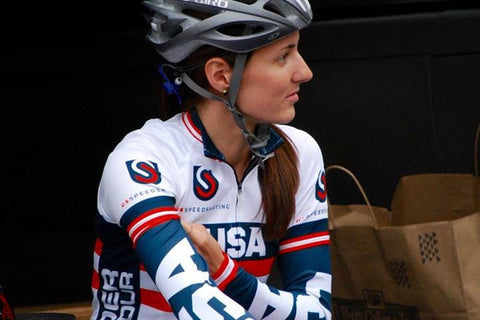
Walk us through your journey -- How did your passion for speed skating start? How did you get to such a high level of achievement in the sport?
Kimi Goetz: I started inline speed skating when I was 8 years old. Inline is similar to speed skating, using wheels instead of a blade. I made a lot of friends and really enjoyed going which is where my passion came from. In 2010 I reached the World Championships, and decided I wanted a new challenge. I took a few years off and then moved to Utah in 2013 to pursue speed skating (short track). In 2018, I switched from short track speed skating to long track speed skating. I am not a super competitive person but I really like the feeling of working hard, so I think that’s what has driven me so much in the sport. The feeling you get after a nice hard workout haha.
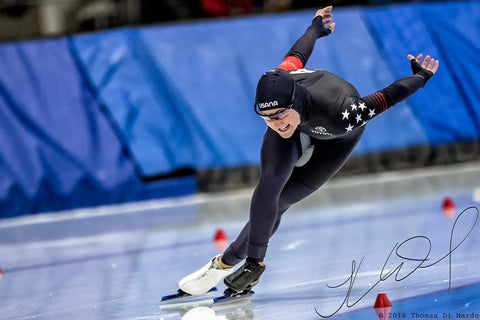
What’s been the biggest obstacle in your career (and how did you overcome this)?
KG: My biggest obstacle has been injuries. I’ve had my fair share, but the worst to overcome was a concussion during the first day of the 2018 Olympic trials. I fell in the warm up because of an equipment problem and I wasn’t able to compete in the trials. At the time it was the worst thing (in my mind) that could have happened, since I had a realistic shot at making the Olympic team. Concussions are tricky because they aren’t like a knee injury where every person with that injury goes through the same PT and rehab, and you know what to expect. Every concussion is different, and it took me four months of physical therapy before I was able to get back on the ice again. I still have a few small side effects that flare up but other than that I am healed!
During the recovery process it was really helpful for me to surround myself with people who didn’t give me too much sympathy, and didn’t allow me to dwell on “what could have been.” I also started seeing a sports psychiatrist which was very key in recovering.
One thing I’ve noticed with the injuries I’ve sustained throughout the years is that the healthier your mindset is during the recovery process, the faster that process will be.
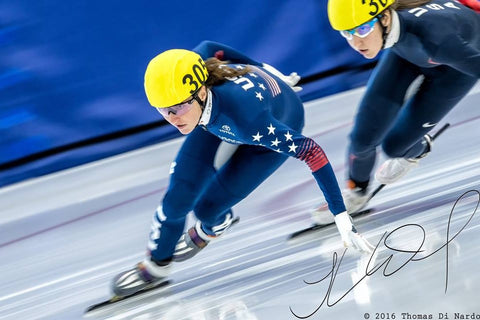
Tell us about your goals: We know you’re aiming for the 2022 games. What does success look like for you? Do you formally “goal-set?”
KG: The main goal would be to: 1) Qualify for the 2022 Olympic Team, and 2) Be a medal contender at the Games.
Success to me is performing the best that you can. When I switched from long track speed skating to short track speed skating, I had to make a lot of physical and mental adjustments and adaptations.
In short track speed skating, the first person across the line is the winner -- So you immediately know who won the race. In long track speed skating, you race against the clock, and oftentimes you need to wait for multiple pairs of skaters to finish before you know what placement you get in that event. One thing I started doing is to ask myself immediately upon finishing a race, before I look at my time, “was that my best effort, was that the best I possibly could have done?” If my answer is yes, then I can not be upset about what placement I get overall because I know the performance was the very best that I could have done.
Walk us through your typical day. What does a day-in-the-life of Kimi Goetz look like?
KG: A typical day for me consists of lots of training and eating haha. Unless it’s a race week, our schedule is normally to the rink at 8:00am. We have an hour of off-ice warm up, and then put our skates on at 9:00am. The on-ice training session goes until 11:00am, and then we have another 30 minute to an hour of off-ice technical exercises. We then have a lunch break, where I go home, take a quick nap and eat lunch. We head back to the rink around 2:00pm and have our second training session -- either weights, another ice session, a bike ride or running.
After that its home, dinner, relaxing and bed. Then repeat.
On Thursdays and Saturdays, we only have morning training. Sundays are our “off” day. I work at a finance company on Thursday and Saturday evenings, as well as Sundays to help offset my costs.
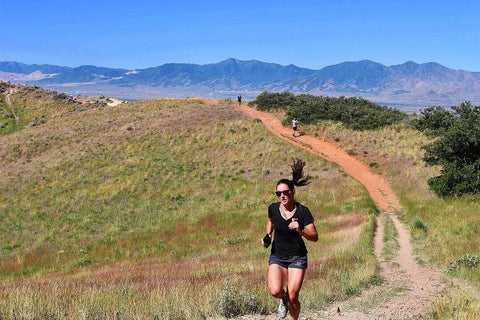
Source: Mountain Leon (Dave Nartin)
What does Kimi Goetz eat in a day? Does your diet change in preparation for a big race?
KG: A typical day for me would be oatmeal for breakfast. I make overnight oats with maple and brown sugar, and top it with fresh fruits and nuts. I eat that 99% of mornings, races or not. :)
Lunch is usually a sandwich or something that settles easily so that my stomach isn’t queasy for the afternoon workout.
Dinner varies but my favorite is a big steak dinner.
I am actually working on a cookbook that is almost done, and it contains all of the dinners that I eat for training and competition!
If you could skate anywhere where would it be and why?
KG: Hmmmm… I really love skating in Salt Lake City (where I live). We travel globally about 12-14 weeks of the year for competitions. It’s fun to travel and see new places but there is nothing like the comfort of being at home -- Getting to sleep in my own bed the night before a race and being with my family (BF and cats haha). But if they could build a rink for me to skate at I would say somewhere right off of a beach. :)
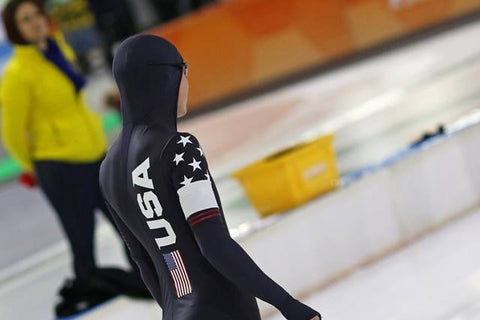
What is your favorite quote to live by?
KG: My two favorites are probably: “A master at anything was once a beginner,” and “Be kind.”
I feel like I “started over” when I switched from inline skating to short track, and again from short track to long track. It’s easy to feel uninspired when you are learning something new and to feel “behind,” so that first quote always made me realize that everyone at one point started from nothing.
And as for “Be kind,” I am in a sport that can make you very selfish. It’s an individual sport, where your teammates are oftentimes your toughest competition. I have always been mindful of not letting this sport turn me into someone that I wouldn’t be proud of. At this time, sport is the most important and biggest thing in my life... But at the end of the day it’s a sport. The person that I am, is much more than the sport that I do so I keep being kind in mind, to make sure that I stay true to myself and keep my grandma proud haha.
In terms of self-care, what are some rituals/products/hacks you SWEAR BY that can instantly add value to all our lives?
KG: In terms of products and stuff, I am pretty low maintenance when it comes to things like that. I don’t wear any makeup unless I am going somewhere very fancy, and my hair lives in a messy bun.
However, there are a few mind rituals that I feel have really helped me.
My favorite “trick” is to make myself a schedule. Sometimes I can feel overwhelmed with training, working, trying to have a social life and trying to work on my cookbook. So now I sit down and write out my weekly schedule every Sunday night. I write down when I’ll be at the rink, when I’ll be at work, when I need to grocery shop and meal prep and do household chores. Then it’s easy to see when I will have some down time to do something for myself -- whether it’s read a book, take a long walk, go on a date with my guy, anything like that. Even if it’s just two 30 minute blocks during the week, it enables me to feel prepared and relaxed.
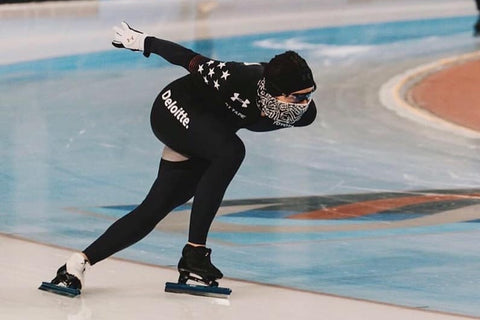
What does balance mean to you and how do you practice it?
KG: Balance to me means making time to do something un-sport specific. At least once a week, I try to do one thing that’s not for my sport. I train for my sport, I work to support my sport, I eat specific things for my sport. I love what I do, I love training, I love racing, and it doesn’t feel like a job but sometimes you just need to not think about it. So once I week I try and forget about it and do something for myself.. it could be going to see a movie, taking a hike instead of the normal run or bike ride, go to dinner with friends.. Anything like that to take my mind away from the sport.
When I first started training full time, I always felt like missing out on things was a sacrifice that I had to make. I had to sacrifice going out with friends because of early training, or sacrifice long weekends off because I had to work… instead now I realize that it’s not a sacrifice, it’s an investment in my future. If I want to win an Olympic medal in 2022, I need to invest in that. Every night in is an investment in that goal.
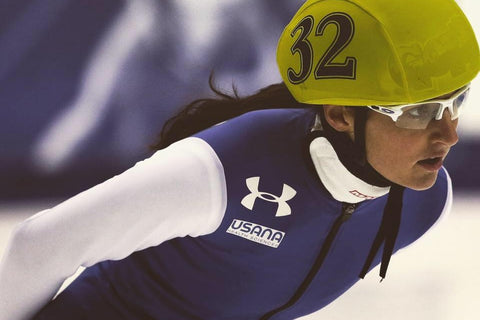
Just for fun: You're stuck on an island and can only take three food items with you. What would they be?
KG: Oooh good question! If I could only take 3 food items I would take eggs, pedialyte/electrolyte drink and mixed nuts (or gr8nola ;).
What’s your number one tip for anyone who wants to achieve gr8ness in their lives?
KG: My advice would be to stick with it and to be willing to adjust your plan around the unplanned.








